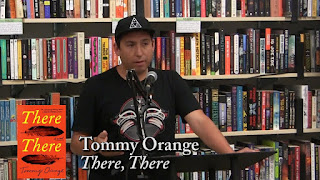New Literary Voices: The Storytelling of Tommy Orange and Kali Fajardo-Anstine
 |
| Tommy Orange, Politics and Prose, July 25, 2018 |
What
if Opal Viola Victoria Bear Shield’s mother is correct, “the
world is made of stories, nothing else, just stories, and stories about
stories”?
What
if, like Sierra’s mother tells her, the land really does “swallow us whole, wrapping
its beauty around us so tight it’s like being in a rattlesnake’s mouth”?
What
if Weh’na Ha’mu Kwasset is correct when she tells us that the land’s
relationship with language, with storytelling, is about the sound that travels
across it, and about how new stories keep the ancient wisdom alive because the
mirror neurons firing in our brains allow us to live these stories?
Science,
it seems, is finally catching up to what storytellers have always known. We live in a responsive world. To hear a story, is to experience a story.
To
speak a word is to vibrate a thought. Writers speak of narrative voice, but we
often forget the power of the voice. Sound carries vibrational frequencies that
can heal body and spirit. Even written language, black words on white pages,
vibrate into existence new, multi-colored ways of seeing and experiencing the world.
Sierra
is a character in Kali Fajardo-Anstine’s forthcoming collection of stories,
Sabrina & Corina. She lives within the pages of a story set in the southern
Colorado town of Saguarita, “a place where the land with its silken fibers of
swaying grass resembles a sleeping woman with her face pressed firmly to the
pillow, a golden blonde by day, a raven-haired beauty by night.”
Sierra
lives within this world of raven-haired Latinas in the shadows of the Native
world of her ancestors—all the while straddling the ragged golden edges of that
other untouchable world.
Opal
Viola Victoria Bear Shield lives between the pages of Tommy Orange’s
award-winning novel There There. She also straddles worlds—the child’s and the
adult’s, the Indian’s and the non-Indian's.
One day, Opal’s mother tells her to pack her things because they’re
leaving East Oakland and heading to Alcatraz. It is 1970. Opal leaves home
carrying two sets of clothes, and a teddy bear named Two Shoes who speaks to
her as if channeling the voice of her Indian ancestors.
Decades
later, Opal utters a prayer to save the lives of those she loves. The prayer is
coming from, "The place where her old teddy bear, Two Shoes, used to speak from."
She recognizes that to have power, the prayer must be said out loud. The prayer
must vibrate with belief. The belief she once had when she was a young girl on
the island of Alcatraz, before hope died, while the future was before them, a
thing of beauty wrapping itself tight around the world.
Opal
shares these pages with twelve other main characters. Through their eyes, the
cadence of their speech, and the intimate corners of their lives, Tommy Orange
brings alive for us what it means to be an urban Indian living far from any
ancestral home, yet in a place where old stories become new stories. A new
relationship rises from the land even when what was there, is no longer there.
KaliFajardo-Anstine brings alive on the page what it means to be a Latina woman in
a land whose stories have only been half told. These new voices remind us that
there are millions of untold stories.
Stories can wrap us in their beauty, swallowing us whole. We discover the inside of the rattlesnake's mouth, and like Sierra's mother, we discover it is both our salvation and our cross. We can live other lives, shed the old skin and come to the land with a new awareness of the multitude of stories lying in wait.
Read
There There and you will feel the firing of mirror neurons as you discover the
many layers of truth to the Native American experience.
Read Sabrina & Corina and the stories will twist and turn, leading you away from what you
thought you knew about the West and her cities, and back to the truths that have
always been self-evident.
NOTES:
Sherri Mitchell, Weh’na Ha’mu Kwasset, is an Indigenous rights activist,
spiritual teacher, and transformational change maker. To read her complete essay on the land's relationship with language, "Hearing the Waters," go to Orion Magazine.
Kali
Fajardo-Anstine’s story collection will be released this April. In the words of her publisher, she "breathes life into her Indigenous
Latina characters and the land they inhabit. Set against the remarkable
backdrop of Denver, Colorado–a place that is as fierce as it is exquisite–these
women navigate the land the way they navigate their lives: with caution, grace,
and quiet force." You may pre-order from Penguin Random House.
Considered one of the best novels of 2018, Cheyenne and Arapaho author Tommy Orange's debut novel There There has garnered high praise from literary corners near and far. The web is overflowing with interviews, reviews, articles and videos about this breakout book and the man who wrote it. I especially enjoyed this video where he reads and talks about the novel on 6/25/18 at
Politics and Prose at the Wharf.
Politics and Prose at the Wharf.






Comments